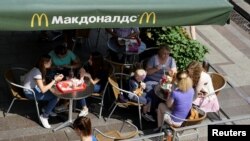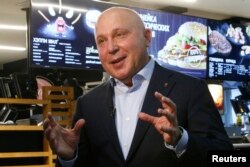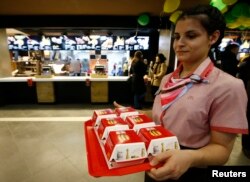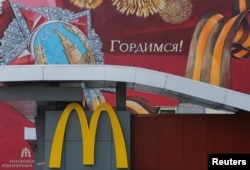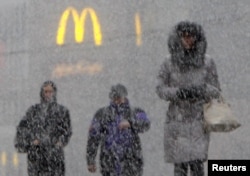When McDonald's opened its first Russian restaurant in 1990 in Moscow, it was not unusual to see wedding receptions held there, so strong was the appeal of the quintessential American brand at the end of the Cold War.
In recent years, with U.S.-Russia ties increasingly frosty, the fast-food chain has pursued a different strategy: Go native.
"We say it every time: We are a Russian company," Khamzat Khasbulatov, the head of McDonald's Russia, told Reuters. "I don't think there's a single company that can call itself more Russian than us."
Nearly all the restaurant's suppliers are Russian and its executives are all Russian, Khasbulatov said in an interview.
The familiar McDonald's logo outside the restaurants is all in Russia's Cyrillic script.
As for the golden arches, he said: "They are Russian arches. They shine wherever they are."
Sanctions brought closures
The company has reason to play down its U.S. associations.
After Washington imposed sanctions on Russia over its role in Ukraine in 2014, Russia's public health watchdog briefly closed down dozens of McDonald's outlets, including its original Moscow flagship in Pushkin Square, citing hygiene concerns.
Some Russian politicians called for the chain to be shut down completely.
Khasbulatov acknowledged the link with the United States was sensitive. "We don't want to be drawn in when something's going on," he said.
A wholly owned unit of the firm headquartered in Oak Brook, Illinois, McDonald's Russia has 609 restaurants around the country and plans to add at least 50 in 2017 after expanding last year to the far-flung Urals and Siberia.
A high-growth market
McDonald's does not disclose its Russian unit's profit numbers but counted it among high-growth markets in its 2015 annual report, with high expansion and franchising potential.
Its Pushkin Square branch is one of the busiest in the world.
Khasbulatov said he hopes to increase the share of franchised branches, which currently account for only 15 percent of outlets in Russia, compared with the global McDonald's norm of 80 percent.
Khasbulatov declined to comment on what the future holds for McDonald's Russia, now that Donald Trump is U.S. president. Russian President Vladimir Putin has spoken about Trump in warm terms, and Trump has said he wants the relationship to improve.
McDonald's has to be pragmatic, said Bob Goldin, a partner at Pentallect, a food industry consulting firm in Chicago.
"My sense is they have to play a real balancing act," he said in an email.
For customers, politics doesn't seem to be that big a deal, however.
One customer told a reporter at one branch near the Kremlin in Moscow, "It's food. Food isn't to blame for political differences."




